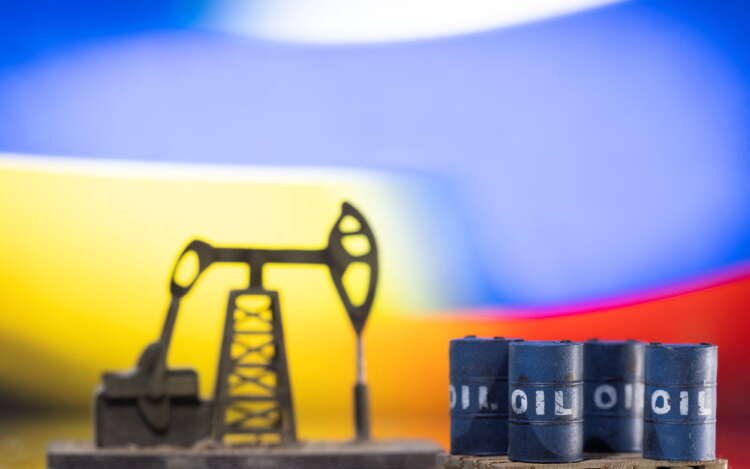Major buyers of Russian oil struggle with bank guarantees -sources


By Dmitry Zhdannikov and Julia Payne
LONDON (Reuters) – The global oil market was thrown into chaos on Thursday after Russia invaded Ukraine, with top buyers of Russian oil struggling to secure guarantees at Western banks or find ships to take crude from one of the world’s largest producers.
At least three major buyers of Russian oil have been unable to open letters of credit from Western banks to cover purchases on Thursday, four trading sources said, citing market uncertainty after the Russian invasion.
Russia produces every tenth barrel in the world and oil prices jumped to above $105 per barrel on Thursday, their highest since 2014, due to fears of disruptions.
In the Black Sea, a Turkish-owned ship was hit by a bomb off the coast of Ukraine’s port city Odessa, prompting shipping companies to avoid calling at Black Sea ports.
Greece urgently recommended all Greek ships immediately leave Ukraine and Russia territorial waters in the Black Sea, ship brokers and a senior Greek maritime ministry official said on Thursday.
The oil market is already suffering from tight supplies due to years of low investment and amid booming demand as pandemic-linked restrictions ease around the world.
“Banks are not willing to open LCs for the moment so it is a bit of a standoff,” one of the sources said. He asked not to be named due to the sensitivity of the issue.
Letters of credit from the bank of the buyer are standard practice in commodities trading and guarantee the seller’s bank that payment will be made in full and on time.
Top Russian oil buyers include Western oil majors such as BP and Shell, ENI, TotalEnergies, Equinor, Chevron and Exxon Mobil and trading houses such as Vitol, Glencore, Trafigura, Gunvor and Mercuria.
The sources did not name which banks refused to issue LCs.
The West has pledged tough sanctions against Russia for the invasion, which could potentially include cutting Russia off the SWIFT financial transaction system.
But it would also have severe implications for the western economy as it could disrupt exports of much-needed commodities amid galloping inflation.
Russia exports around 4-5 million barrels per day (bpd) of crude and another 2-3 million bpd of refined products. China, the EU, South Korea, India and Japan are its main buyers.
Some traders spoke of the Iranian syndrome, when major western institutions exercised restraint and caution before sanctions have been even imposed for the fear of transactions potentially breaching future regulations.
“We look at all deals case by case. But no hard stop,” a senior executive at a major European bank said, indicating a slowdown for Russian oil and commodity deals.
Most top Western banks are active in financing oil and commodities and issue LCs.
It was unclear to what extent the lack of letters of credit could disrupt Russian exports, with some traders saying it would take at least several days for companies and banks to figure out the new legal environment.
Meanwhile, shipping rates to load at Russian ports and discharge in northern Europe have tripled in one day to World Scale 300, or about $2.3 million per ship, from World Scale 100, as many ship owners now refuse to call at Russian ports.
“Some 90% of ship owners are telling us they will sit and assess the situation,” a ship broker said.
“We’ve had one owner saying they will not work with Russian counterparts.”
One tanker, the Delta Sailor, was fixed at World Scale 300 to load at Russian Baltic oil ports on Feb. 28 to March 1 to sail to northwest Europe. Earlier in the day, the Minerva Helen was similarly booked at short notice to load from the same area at over World Scale 200.
(Reporting by Dmitry Zhdannikov and Julia Payne, additional reporting by Ahmad Ghaddar and Rowena Edwards; editing by Jason Neely, Bernadette Baum and Diane Craft)
Explore more articles in the Banking category











